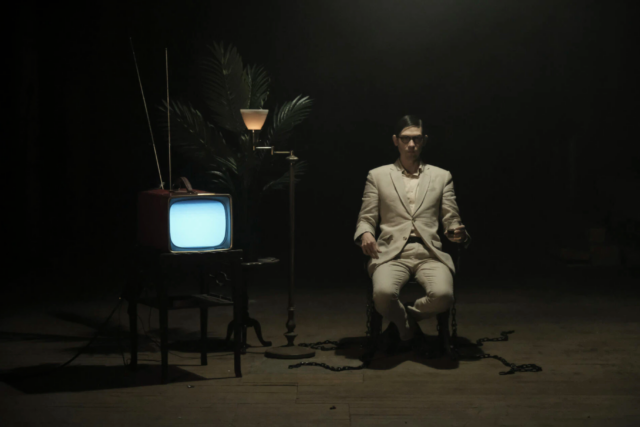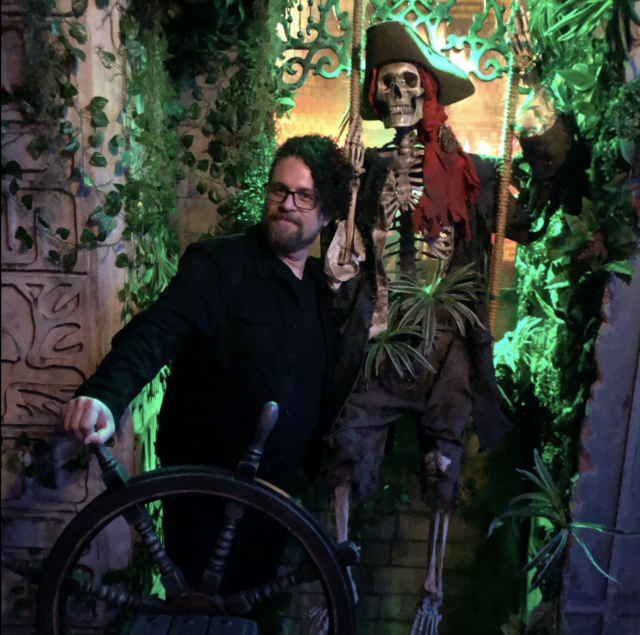
Timur Bekbosunov stars onstage and onscreen in David T. Little’s Black Lodge (photo by Matthew Soltesz)
BLACK LODGE: LIVE MULTIMEDIA EXPERIENCE
BRIC Arts Media House
647 Fulton St., Brooklyn
January 11-15, $35-$150
bricartsmedia.org
prototypefestival.org
“Art is not a mirror with which to reflect society but a hammer with which to shape it” is a popular quote attributed to Bertolt Brecht — and a favorite of contemporary composer David T. Little’s. Born and raised in the New Jersey countryside, Little is a renaissance man when it comes to opera. He was inspired to become a composer after being enthralled by Danny Elfman’s gothic score for The Nightmare Before Christmas, which he saw when he was fifteen; he later played drums in a rock band and got into musical theater and the avant-garde before turning to classical music.
He incorporates these elements and more into each of his works, which explore sociopolitical issues in unique and subtle ways. JFK is a two-hour grand opera that takes place the day before JFK’s assassination; Soldier Songs tells the story of a young veteran suffering from PTSD; and What Belongs to You is based on Garth Greenwell’s novel about an American teacher obsessed with a hustler in Sofia, Bulgaria.
In these and other pieces, Little, a two-time Grammy nominee, reshapes expectations of what opera is and can be while working with a wide range of impressive collaborators in multiple genres of music, movement, and film. This weekend, his seventy-minute industrial opera Black Lodge makes its New York debut, running January 11–15 at BRIC Arts Media in Brooklyn; it’s part of the Prototype festival, a coproduction of Beth Morrison Projects and HERE that focuses on new multidisciplinary opera and musical theater works.
The live multimedia experience, set in a bardo where a writer (Timur Bekbosunov) struggles with his demons and encounters a mysterious woman (Jennifer Harrison Newman), features a libretto by poet Anne Waldman, sound by Garth MacAleavey, lighting by Matthew Steinberg, film written and directed by Michael Joseph McQuilken and photographed by Daniele Sarti, and performances by tenor Timur and the Dime Museum and the Isaura String Quartet, who present such songs as “Electric Cerberus,” “The Hungry Ghost Who Sings in Lamentation,” and “Premonition of the Worm.” Timur and his band appeared at the inaugural Prototype in 2013, as did Little’s Soldier Songs; the opening night of Black Lodge includes an immersive concert by Timur and the Dime Museum, while the January 12 show at 5:00 will be followed by an artist conversation.
In a twi-ny talk, Little discussed his eclectic taste in music, collaboration, bearing witness, and grappling with big questions.

David T. Little navigates through the world of opera in unique and inventive ways (photo courtesy David T. Little / Instagram)
twi-ny: You have composed works for string quartets, percussion quartets, contemporary ensembles, solo cello, church choirs, and others, with music styles ranging from classical and operatic to rock, goth, metal, and punk. What type of music did you listen to growing up? How did your taste become so eclectic?
david t. little: I grew up in a house that was full of music. For one, classic musicals, so music theater was in my DNA from the start. Also in heavy rotation at the time was ’50s/’60s pop (aka “oldies” at the time), Johnny Mathis, the Ink Spots, Dave Brubeck, Peter, Paul, & Mary, and the Kingston Trio. Then a little later — through my stepparents — Harry Chapin, Willie Nelson, and Garth Brooks crept in, all great musical storytellers.
Around age ten or so I started to discover harder/heavier music: Run-DMC and the Beastie Boys, the Cure, and hair metal; then Led Zeppelin; then through friends: Public Enemy, Megadeth, Guns n’ Roses, Nine Inch Nails, Ministry . . . then Pantera, then Napalm Death, Morbid Angel, etc. I also had an aunt who made a copy for me of Pink Floyd’s The Wall, which was life-changing. And when I was fifteen I went to a summer program at Berklee to study jazz drumming, where I heard a Naked City cover band (seriously) which blew my mind. The Rite of Spring came not long after, as would a period of intense obsession with Oingo Boingo, and a few years later a similar obsession with Ani Difranco, Dar Williams, and Utah Phillips.
And this whole time I was also playing in a fife and drum corps, playing Revolutionary and Civil War–era tunes, performing onstage in musicals, and exploring classical music. My grandfather was a great lover of classical music and played the organ. I heard a lot of music for the first time through him. My stepfather also had a lot of records of classical music, which I’d listen to: one that had [Charles Ives’s] “The Unanswered Question” and [Sergei Prokofiev’s] “The Love for Three Oranges Suite” was especially transformative.
So I don’t know, I think I just always loved music! If there was music to be heard, I wanted to hear it. I certainly had likes and dislikes, but it was never about genre per se. It was just about what spoke to me and didn’t — that’s still how I listen, and I still listen to a really wide range.
twi-ny: That wide range is also evident in many of the famous figures who have influenced and/or inspired your work, from JFK, Iggy Pop, and Spalding Gray to Robert Johnson and the Freedom Riders. In the case of Black Lodge, it’s David Lynch, William S. Burroughs, and Antonin Artaud. Do you see any commonalities in these people, specifically the last three?
dtl: Writing a piece of music provides a great opportunity to think about big questions, and I think for me each of these figures you mentioned poses some kind of a big question through their life or their work about something that felt really important to me at the time.
I also want to mention a few others whose names might not be as widely known: Last Nightfall was inspired by Rufina Amaya, the only survivor of the massacre at El Mozote. and the sky was still there was inspired by the story of my friend Amber Ferenz separating from the US military. And of course there are all of the people who lent their voices to Soldier Songs: Amber, of course, but also Justen Bennett, Rich Girardin, my grandfather Joe Little, uncle Gene Little, and stepfather Gene Woznicki. And of course Remedios Varo, Leonora Carrington, and Lou Harrison (in “The Conjured Life”) and Utah Phillips (in “Valuable Natural Resources”). I think some of this may be about documentary, about bearing witness to events, and people, what they did and how they lived.
But sometimes it is less clear. This was definitely the case with Lynch, Burroughs, and Artaud. I was initially drawn to what I saw as common threads in their work, which made me ask whether there was any influence between them. Not finding evidence of that, the really interesting questions started to emerge: If they hadn’t influenced each other, what accounted for the commonalities? This then became about the psychological and the spiritual. That, to me, is where the piece really lives.
These are three figures whose work stares the dark and difficult squarely in the face, and they were doing so — I believed — in search of some kind of spiritual balm. This was something I was grappling with at that time myself, which stemmed from questions to do with depression, escape, transcendence, spirituality, and the darker parts of life, including processing trauma. I found that Lynch, Burroughs, and Artaud all grappled with some versions of these issues (and others) through their work.
As I wrote the piece, winnowing my way through a dark and strange ten-year-long path, I was trying to move toward some sort of light at the end of the tunnel, which I thankfully found. I think those who have traveled a similar road will feel this story in the piece, even as the narrative itself is more abstract.
twi-ny: During the pandemic, you virtually reimagined Soldier Songs with Johnathan McCullough for Opera Philadelphia, where Black Lodge premiered online. What was it like turning Black Lodge into an in-person live presentation in front of an audience — and essentially doing the opposite with Soldier Songs?
dtl: It has been a really thrilling process full of discoveries! It is amazing to see how the brain tries to parse what it is seeing and hearing during the live show. Like, you know that Timur is singing live, but he is so synced with his image on the screen, you start to hear the live sound as recorded. Similarly with the visual world — the live image and the film somehow blur in your perception, making you doubt your senses. It really messes with you in a terrific way that feels totally perfect for what Black Lodge is exploring.
twi-ny: Timur is remarkable in it. Did you always have him and his band in mind when you were putting the show together?
dtl: My partner in crime! Yes — Timur was the voice of the piece from the beginning, absolutely! He’s so amazing. I first heard them perform at Prototype, actually, all the way back in 2013. His performances of both Nine Inch Nails’ “Closer” and Klaus Nomi’s “Total Eclipse” just blew my mind, and I knew immediately that I needed to work with him and the band, who are equally amazing. It has been a real pleasure to build this piece for and with him.
twi-ny: You are program chair at Mannes at the New School, where you teach New Opera Labs. What are your thoughts about the future of opera, based on what your students are doing and the success of such festivals as Prototype? A lot has changed over the last twenty-five years in the world of opera.
dtl: I think the opera world right now is also full of big questions. During the pandemic, there was such an eruption of inventiveness and creativity, because we needed to pivot somehow just to survive. To me that was the “shock doctrine” moment our field really needed, and I had high hopes. But since things reopened, a big part of the field has just gone back to their prepandemic plans, as if pretending that we hadn’t been permanently altered by what we experienced in those years! Add to this the fact that things have become very expensive to produce and you have an industry that has grown more risk averse, which are not great conditions for new work.
The good news is that most artists don’t tend to think or care about this stuff. We’re going to make the work we need to make, that feeds our souls, and then we’ll figure out how to put it onstage. My students at Mannes (and our alums) are doing tremendous work in this area — rethinking what opera can (and will) be moving forward — and, like always, we will find a way to make those pieces happen as a community.
All this to say, the operatic future I imagine is, by and large, the same as the world I came up in: a DIY scene where artists make work they love and make performances happen despite impossible odds. This, to me, is where the most interesting work has always originated, work that then gets taken up by forward-looking opera companies and producers. I’m grateful for festivals like Prototype and producers like Beth Morrison who continue to provide vital support to the artists who really see the future and insist on taking us there.
[Mark Rifkin is a Brooklyn-born, Manhattan-based writer and editor; you can follow him on Substack here.]